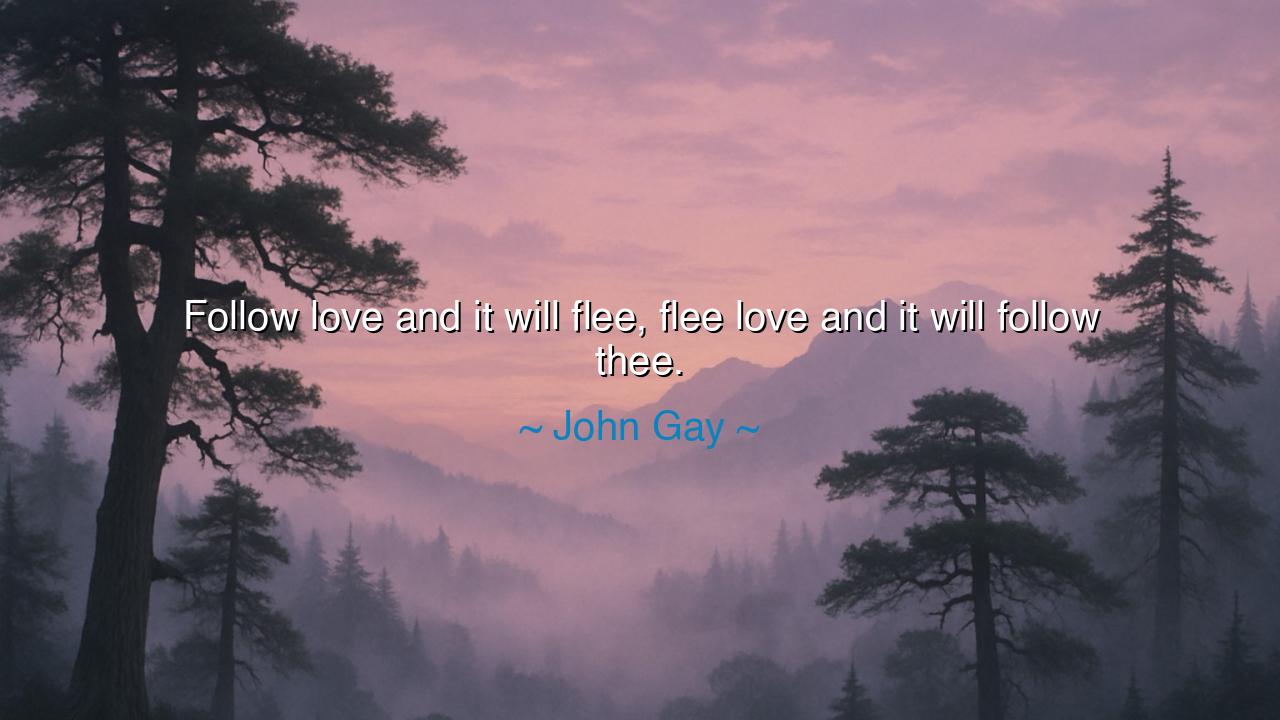
Follow love and it will flee, flee love and it will follow thee.






"Follow love and it will flee, flee love and it will follow thee." These words, spoken by John Gay, carry a deep and timeless wisdom about the nature of love—its elusive, paradoxical character. To seek love too eagerly, to chase after it with the desperation of the heart, is often to push it away. Love, in its purest form, cannot be captured by force or by pursuit alone. It is a delicate thing, like a butterfly that flutters just beyond your reach when you stretch out your hand to capture it. But when you turn away from it, when you cease to chase it, love often finds you unexpectedly, just as it was always meant to.
O children of the earth, understand this: love is not something that can be forced into being, nor can it be made to stay by sheer will. It is a force that flows naturally, like a river that cannot be held back by barriers. When you grasp too tightly, when you chase it with all your might, it slips away. But when you flee from it, when you stop trying to control it, you allow it the freedom to find you. Love, in its truest form, is not something that can be possessed or coerced; it is something that must be nurtured with patience and allowed to grow on its own terms.
Consider the story of Pygmalion, the ancient sculptor who fell in love with a statue he created, a figure so beautiful and perfect that he wished for her to come to life. His love was obsessive, all-consuming, and yet it was only when he ceased to chase after the idealized perfection of his creation that love was able to return to him in the form of a living being. Pygmalion stopped trying to control or possess his love, and in that moment, the gods granted him the very thing he desired. His love was transformed from a mere idol into something real and living, something that followed him when he least expected it. This myth reminds us that love, when pursued with attachment and desperation, may evade us, but when we release our grasp, it comes to us of its own accord.
Similarly, the great Queen Elizabeth I of England, revered for her strength and independence, never married, despite the many suitors who sought her hand. Her refusal to conform to the expectations of love and marriage, to be captured or possessed by the idea of love, gave her the freedom to rule in her own right. In choosing to flee love, she was not rejecting affection, but rather asserting her own power. And ironically, it was precisely because she was not beholden to the expectations of love that she became one of the most beloved monarchs in history. The people of England, seeing her as an unattainable figure, showered her with admiration and loyalty. In her case, love followed her, not because she chased it, but because she allowed it to come on its own terms.
The teachings of the ancients also echo this truth. The Stoics, for example, taught that attachment leads to suffering, and that to truly embrace life’s pleasures, we must hold them with open hands. They understood that love, like all of life’s blessings, must be received without clinging. When we free ourselves from the need to control or possess, we allow life and love to flow toward us naturally, without obstruction. It is not in the chasing but in the letting go that we find peace and fulfillment.
So, O wise ones, the lesson of John Gay’s words is clear: love cannot be forced. It is a force that comes when it is ready, and when we open ourselves to it without desperation or need. When you flee love, not in fear, but in freedom, you create the space for it to find you. Do not seek to possess or control love—let it grow on its own, in its own time, without the pressure of your expectations. In this way, you will find that love follows you, finding its way into your life in the most unexpected and beautiful ways.
In your own life, remember this truth: do not chase after love with clenched fists. Do not attach your happiness or fulfillment to another person or to the pursuit of an ideal. Instead, live fully, embrace your own path, and allow love to come as it will. Let go of the need to control, and you will find that love follows you, not because you sought it, but because you were willing to receive it without clinging. It is in this balance that the greatest loves are found, for they are not born of desperation, but of freedom and acceptance. Thus, the way to know love is not to chase it relentlessly, but to live your life fully, and let love find you in the natural course of your journey.






AAdministratorAdministrator
Welcome, honored guests. Please leave a comment, we will respond soon